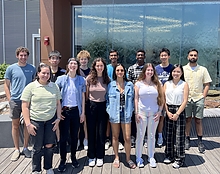REU Interns Learn to Navigate Complexities of Health Research

The students were part of the highly competitive Bioinformatics Research In Data science for Genomics (BRIDGE), a program that’s supported by the National Science Foundation’s Research Experiences for Undergraduates (REU).
Run by faculty and graduate students in the Center for Bioinformatics and Computational Biology (CBCB), the 10-week program is an opportunity for students to tackle their research questions in the field for the first time, says Michael Cummings, a professor of biology and director of the center.
“It may result in a research publication, and allows them to work in a setting that is just focused on research,” he adds, noting that this year’s cohort of REU students had a 5% acceptance rate.
Sarah Blankespoor, a rising senior at the California Polytechnic State University majoring in public health, is working on genome polishing with neural networks while being advised by Mihai Pop, a professor of computer science and director of the University of Maryland Institute for Advanced Computer Studies (UMIACS).
Blankespoor says the goal of this research is to improve the accuracy of pathogen and mutation identification. She and Pop hope this technology will be used to diagnose pathogens and identify different mutations that occur in the gut microbiome.
Maddie Bonanno, a rising senior at Tulane University, is majoring in computer science and cell and molecular biology with a minor in mathematics. This summer, Bonanno was advised by Erin Molloy, an assistant professor of computer science.
Their research focused on attempting to find the best software to sort the evolutionary history of organism groups. Such analyses are called phylogenetics and can be applied to the DNA or amino-acid sequence of genes.
In addition to their research projects, Cummings says the students learned how to deal with general issues, such as time management, communication, problem specification and facing setbacks. He notes that these lessons expose students to what higher level research looks like.
Tobias Rubel, a third-year computer science Ph.D. student, served as a mentor to this year’s interns. They say the program allows students to expand their research abilities and see if they want to pursue a research career.
For some students, their summer projects will continue on. Both Bonanno and Blankespoor, along with their respective advisers, say they will keep investigating their respective topics because the program helped them develop a deep passion for research.
—Story by Ethan Cannistra, UMIACS communications group
